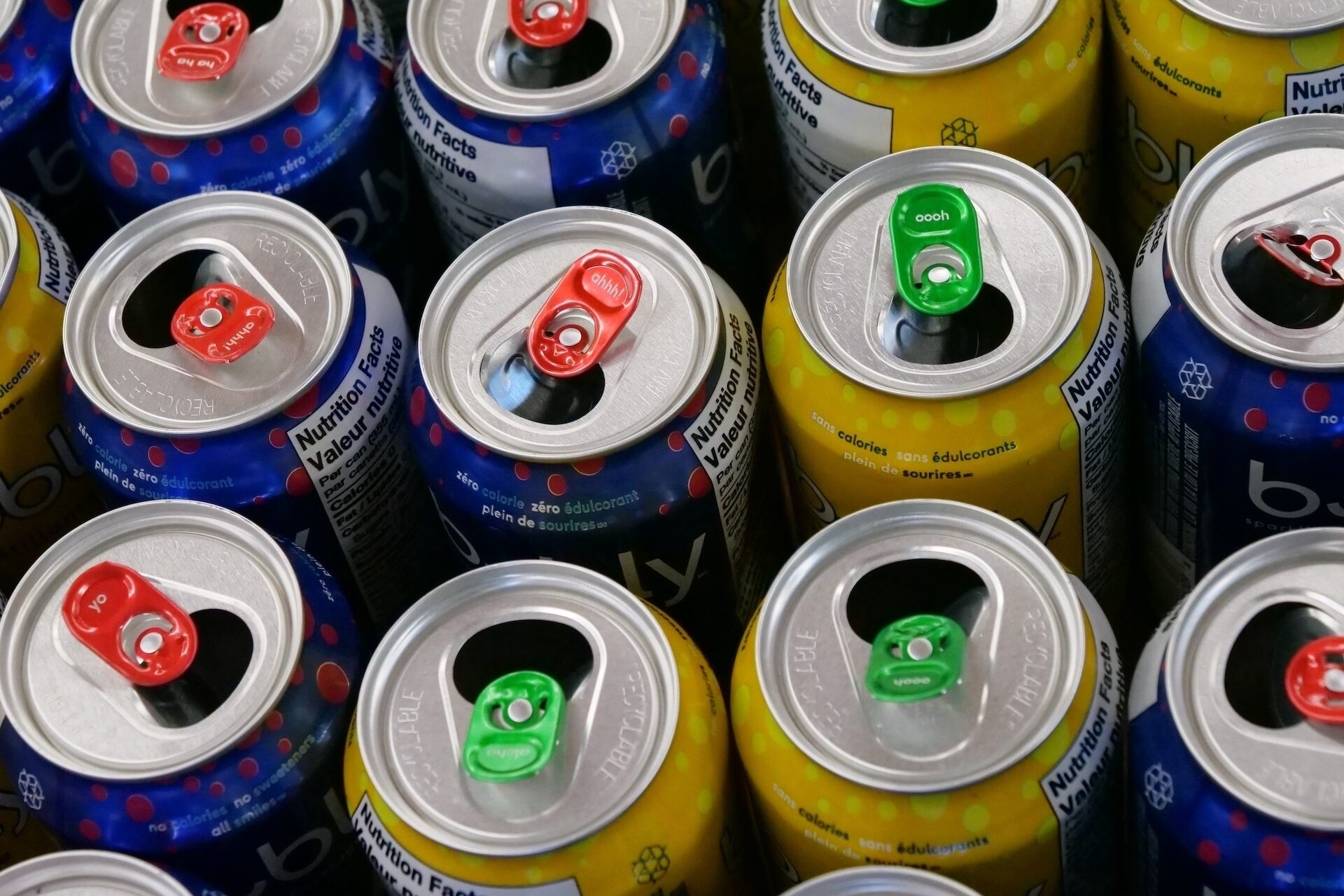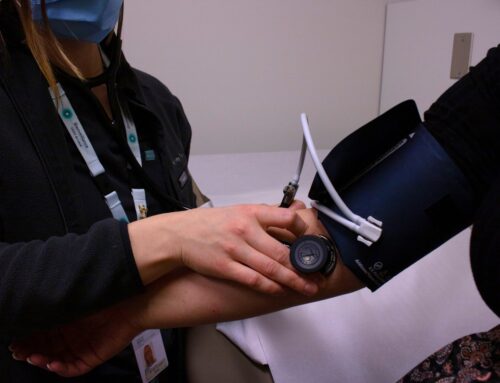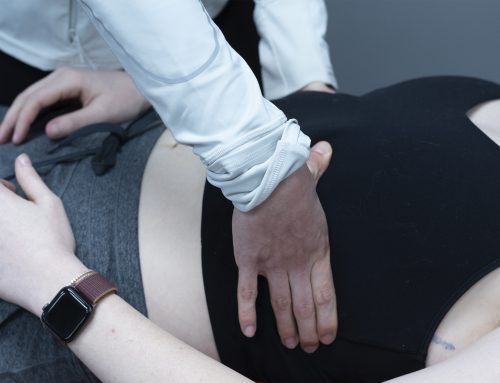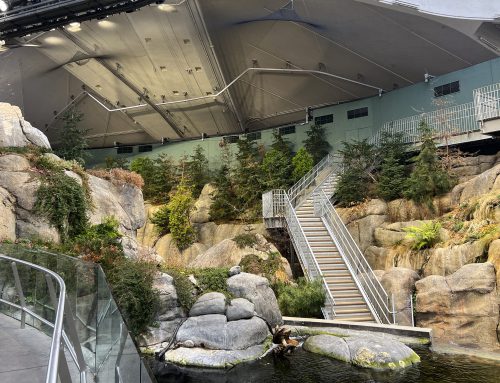BY Emily Pasquarelli & Jacqueline Lisbona
Jody Aveline begins his morning pedaling down a Verdun alleyway on his recycled bike. A mini trailer hitched behind him is filled with empty cans and bottles. Within a half hour, Aveline arrives at the IGA on Wellington Street, where he returns 328 containers and gets a refund of $32.80.
“I have people from all over the city that register to use my service because they believe in what I’m doing. They believe in what I’ve accomplished,” says Aveline.
For nearly a decade, Aveline has run a pick-up service seven days a week from 9 a.m. to 7 p.m. which consists of collecting clients’ bagged cans and bottles to recycle them at local grocery stores.
It all began in 2015 when Aveline was looking for a job. After countless rejections, he discovered the gaps in Quebec’s recycling industry leading to a huge amount of waste being dumped in the province’s landfills every day.
This inspired his own mobilization—creating his own social enterprise, Cans4Cash Collection Service (C4CCS).
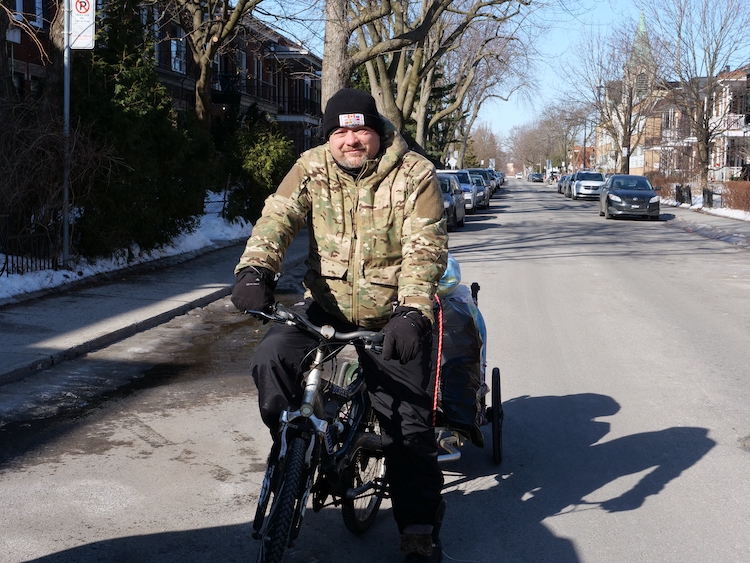
Jody Aveline, founder of Cans4Cash Collection Service, rides his bike loaded with bagged empty cans and bottles through Verdun, Montreal. Photo by Emily Pasquarelli.
Last year, environmental NGO Équiterre reported that 6,000 bottles go to waste every five minutes in Quebec. Every day in the province, more than two million plastic bottles are either landfilled or discarded.
According to a 2022 report by Quebec’s Office of Environmental Public Hearings, if Quebec doesn’t reduce its rate of waste production, nine of the province’s 38 landfill sites will be full in less than six years. Thirteen more sites are expected to be full by 2041.
Anthony Côté-Leduc, Communications Officer for environmental group Équiterre, argues that Quebec portrays itself as a very “ecological” and “green” place. However, in reality, he says there is a gap between awareness and action.
In 2021, Équiterre conducted a research campaign with the Polytechnique Montréal’s Chaire Mobilité to understand the proliferation and increasing size of SUVs on Canada’s roads. The NGO proposed action to curb these non-eco friendly habits, including stringent federal regulations. The response: “intense backlash” from the public.
Côté-Leduc suggested that Quebecers’ resistance to individual action is no different than others across North-America; to him, it’s a part of “human nature.”
“Change is hard, and we live in a time period where our attention, our time and our money is solicited at every junction, our attention is divided, and some of us just don’t have the mental space to take on these actions,” Côté-Leduc says.
For example, Côté-Leduc described composting as a larger hurdle for Quebecers, but he argues that it’s not a significant habit change and the resistance comes from it being a newer concept. In October 2024, Montreal opened its first compost plant.
Starting in March, 2025, Consignaction expanded Quebec’s bottle and deposit-refund system to include all plastic bottles ranging from 100 ml to 2 L. To Aveline, the campaign is a “baby step forward.”
As of March 1, 2025, Quebec’s Consignaction recycling program expanded to include plastic bottles, introducing a 10-cent deposit per bottle to promote recycling. Video by Jacqueline Lisbona.
“What can you buy with 10 cents? What can you buy with 25 cents? How many people are going to lug a case of 12 bottles of wine, which is heavy, it’s glass, for $3?” Aveline says. “People are buying a bottle of whiskey, for example, at $60. Why not put a refund on there of $1 or $2? It would encourage people to return for their money.”

A guide to Quebec’s bottle and can refund system. Infographic by Emily Pasquarelli.
Aveline stresses the need for more community-driven solutions to reduce bottle and can waste.
“Instead of throwing them out, why not put them aside for a social enterprise that gives back to the community,” asks Aveline.
While some may question the incentives and genuine impacts of sustainable actions like Aveline’s on the environment, experts argue its practical purposes. It not only reduces the amount of aluminum and glass in landfills, but it also influences a collective response.
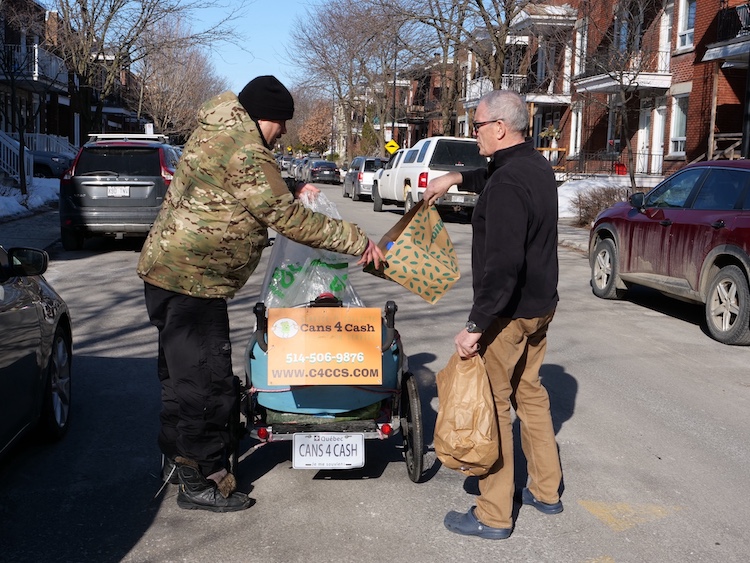
Aveline organically meets a fellow Verdun resident outside their home to collect donated empty cans and bottles. Photo by Emily Pasquarelli.
“From a sustainability standpoint, all the little actions add up” says Ricardo Duenez, a professor and environmental researcher. “It’s hard to see it because we feel so overwhelmed with today’s news, big ticket events happening out there, it’s hard to concentrate on a lot of things but it’s up to certain individuals and groups to really keep that spirit alive, and it’s not easy.”
Duenez says these false narratives largely derive from a collective feeling of being “overwhelmed” by climate change. This is an emotional response described as climate anxiety or eco-anxiety.
Individuals also share differing values, and consumption and consumerism play a significant role in influencing people’s actions.
“If you’re raised a certain way, it’s hard to break out of that mold until you meet new influences,” he says.
Kregg Hetherington, an environmental ethnographer, says that with a shift in mindset, value can have a whole new meaning and help spur individual action.
“If you think of value as always a collective enterprise, as always some form of collective meaning making, then that’s how we thrive as humans who have ethical kind of inclinations in the world,” he says.
Hetherington says the same way money has value, environmental ethics also have value; these two things only work to an extent through conversation with others.
“If nobody recognizes the value of your money, it’s not worth anything.” This same mindset applies to individual action.
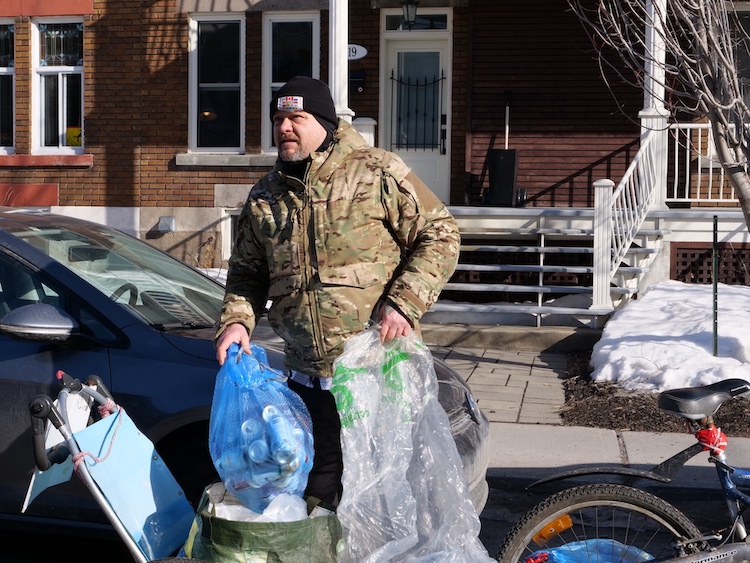
C4CCS accepts donations to keep the social enterprise alive. Aveline is looking for two electric bikes, studded winter tires, and used trailers to convert into “Cans4Cash mobile trailers.” Photo by Emily Pasquarelli.
For environmental experts, it’s difficult to say whether Quebec is lagging when compared to other Canadian provinces.
“It’s ‘apples to oranges,’” says Duenez. “I hesitate to say that nobody is doing a lot better than another right now because it certainly breaks down to rural and urban life.”
Other critical aspects to consider are demographics, generations, and immigration issues.
“I think we have to find a way to speak about individual action in a way that is empowering but also realistic,” Côté-Leduc says. “It does have an impact, and small individual action can serve as a springboard to larger collective ones, and to say that they are insignificant or have no sway over the crisis is just misleading.”
Duenez recommends individuals to be aware of the demographics involved in their inner-circle, and focus on fostering social cohesion to take environmental action.
“Simply ask oneself how aware are we of our individual habitats and the people that surround us?” he says. For example, if one lives in a neighbourhood with many seniors, asking “How carefully are we monitoring our neighbors? […] or single moms with three or four children?” makes an impact.
And that’s exactly what Aveline is doing—checking in on his community—bottle by bottle.
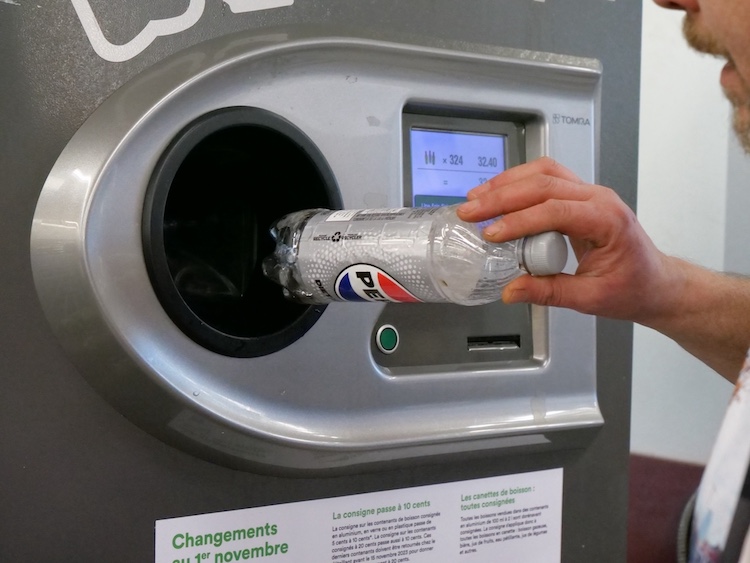
Aveline returns his donated cans and bottles at an IGA on Wellington Street in Verdun, earning a total of $32.80 from a quick morning pickup run. Photo by Emily Pasquarelli.
“More and more people are struggling. When you see the lines at food banks, people are in need. They’re gaining food,” Aveline says. “Those who donate “know that they’re money is going to a good cause. It’s not ending up in a landfill.”
Aveline’s initiative has enabled him to pay it forward—donating about $30,000 so far. Since June of 2015, he completed over 2,700 volunteer hours within the Montreal community.
And he’s nowhere close to being done.
